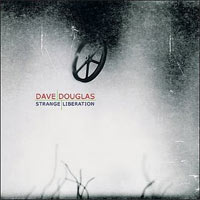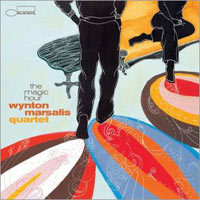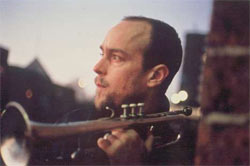Biography:
DAVE DOUGLAS (born March 24, 1963)
“Trumpet Player of the Year”, “Jazz Artist of the Year”, the Guy with Two First Names
by Mark Allred
By now, Dave Douglas has been named “Trumpet Player of the Year” and “Jazz Artist of the Year” and “Composer of the Year” and the leader of “Record of the Year” by virtually every relevant publication that covers jazz. Dave Douglas had released Strange Liberation the same year Wynton Marsalis released The Magic Hour. Both albums featured high-profile special guests: Bill Frisell on guitar with Dave Douglas and Dianne Reeves and Bobby McFerrin singing on one song each with Wynton Marsalis. Being an avid follower of Frisell I was drawn to Strange Liberation like a moth to a flame. It was on par for Douglas and band but Frisell was somewhat disappointing in comparison. Frisell appeared on eight of the eleven original songs. On Catalyst, Frisell really cooked blending with the band like the previous songs were just a warm up effort. That one song almost compensates for any other attempt by Frisell that might be considered anemic or subdued, at times sounding like the token outsider making an awkward guest appearance.
A review of six releases by David Douglas are presented for your perusal just after the biographical information. After reading or skipping (your choice) the biographical sketches found below, follow this link: http://jazztimes.com/articles/14551-strange-liberation-dave-douglas to a really well written Jazztimes article by Thomas Conrad comparing Dave Douglas to Wynton Marsalis. It begins by reviewing these two albums released at the time in 2004 by each artist but quickly delves deeper into the similarities and differences of their backgrounds as well as their current status in the jazz social order. The observations by the author extend past the two releases and are applied to the careers of both musicians.


Excerpts from the article from Jazztimes:
“Douglas and Marsalis are the two most prominent trumpet players in jazz, but their renown is of two different orders.”
“Douglas, now 40, is a foot soldier in the jazz wars, a working-class hero who has gigged and recorded all over the world with the famous and the obscure from every nook and cranny of jazz.”
“But Dave Douglas’ reputation exists within the small, insular niche of the jazz culture. Wynton Marsalis, by contrast, is a superstar-arguably the only living jazz musician famous enough to be identifiable by his first name only, even in the world at large. He is only two years older than Douglas, but he got an earlier start. He was a prodigy who attended Juilliard when he was 17 (Douglas went to Berklee), joined Art Blakey’s Jazz Messengers at 18 and released his first album as a leader when he was 20.”
“The professional successes that these two artists have enjoyed have come largely because of the jazz press, in the case of Douglas and in spite of the jazz press, in the case of Marsalis.”
Biographical Sketches
by Chris Kelsey from allmusic.com
Dave Douglas arguably became the most original trumpeter/composer of his generation. Douglas’ stylistic range is broad yet unaffected; his music is not a pastiche, but rather a personal aesthetic that reflects a wide variety of interests. He explicitly cites such diverse influences as Igor Stravinsky, Stevie Wonder, and John Coltrane. As a composer, Douglas adapts and synthesizes unusual forms and creates his own out of disparate elements. As a trumpeter, Douglas possesses a comprehensive jazz technique; certainly, one hears the ghost of Lester Bowie in Douglas’ expressive manipulations of timbre and pitch, but more pronounced is the integration of distinctive compositional and improvisational conceptions that ultimately defines his work.
Douglas grew up in the New York City area. He started playing piano at the age of five, then trombone at seven before discovering the trumpet at nine. He learned jazz harmony in high school and began playing improvised music as an exchange student in Barcelona, Spain. From 1981-1983, he studied in Boston, first at Berklee School of Music, then the New England Conservatory. He moved to New York City in 1984, where he attended New York University and studied with Carmine Caruso. In 1987, he toured Europe with Horace Silver. The early ’90s saw Douglas begin to record in earnest; he led or co-led dates for the Hat Art, Soul Note, New World, and Arabesque labels. His various bands included the Tiny Bell Trio, a self-described “jazz-Balkan-improv” group with drummer Jim Black and guitarist Brad Shepik (who used the surname Schoeppach at the time); his String Group, which included violinist Mark Feldman, cellist Erik Friedlander, and bassist Mark Dresser; and his Quartet and Sextet, which included drummer Joey Baron. Also busy as a sideman, he could be heard during this period on recordings by Patricia Barber, Myra Melford, Anthony Braxton, and John Zorn (particularly the latter’s original Masada quartet), among others, and the trumpeter has continued such collaborations through to the end of the new millennium’s first decade.
http://www.allmusic.com/artist/dave-douglas-p71918/biography
(from Dave Douglas website)
Two-time Grammy-nominated jazz musician Dave Douglas is the most prolific and original trumpeter-composer of his generation. From his New York base, where he has lived since the mid 1980s, Mr. Douglas has continued to earn lavish national and international acclaim including prizes from such organizations as the New York Jazz Awards, Down Beat, JazzTimes, Jazziz, and the Italian Jazz Critics Society. His solo recording career began in 1993 with Parallel Worlds on Soul Note Records, and he has since released more than 30 recordings. In 2005, after seven critically acclaimed albums for Bluebird/RCA, Mr. Douglas launched his own record label, Greenleaf Music. The same year, he was honored with a Guggenheim Fellowship. On Greenleaf, Mr. Douglas has released albums with his long-standing quintet, the electronic sextet Keystone, and the mixed chamber ensemble Nomad. In 2009, he released Spirit Moves with his new brass quintet, Brass Ecstasy and his first big band recording, A Single Sky, a collaboration with Jim McNeely and Frankfurt Radio Big band. This year brings a new collection of work by Keystone entitled, Spark of Being, a retelling of the Frankenstein myth in collaboration with award-winning filmmaker Bill Morrison.
Six CDs by Dave Douglas selected from the Manieri Collection
Soul on Soul – 2000
Everyone knows that for a trumpet and saxophone to hit the same note is an accomplishment. Certainly to play an entire bridge or melody or anything that requires a number of the same notes to be sustained in unison for an extended period of time or for a set number of notes is just short of miraculous. Maybe I have too much of a preference for solo oriented jazz but it seems like after a certain effect has been accomplished it is time to move on. Dave Douglas likes the two-horn unisound drone and uses it here often, as in every song. I find it too much of a good thing.
The first 5 originals by Douglas produce a heavy dragging sludge sound all the way to the 3 originals written by Mary Lou Williams that surprisingly somewhat take wing in comparison. They seemingly even influence the last three songs by Douglas before the album ends with another welcomed original by Williams. Perhaps the writing here by Douglas is more objectionable than the delivery although the delivery of the songs penned by Williams follow the same muddy ruts on the path established earlier in this release by Douglas.
Freak in – 2003
This CD finds Dave and band in sync with numerous musical styles diving head first into electric Jazz layered with serious swing and post bop. It is progressive while keeping with the old world jazz values. Bitches Brew and On the Corner from the Miles Davis vision have now entered the building through some other dimension of time and space. Black Rock Park is a reflective image of Live Evil born out of another parallel universe. The percussionist sets the pace from fast to plodding and plays a pivotal role. The recording is clean and balanced. This band with its nouveau modern sound is like a young wine made from a flavorful blend of classic European grapes. It may be better appreciated aged and enjoyable slowly sipped but once uncorked you will want to finish the bottle.
Mountain Passages – 2005
Summit Music, the first song in this release is reminiscent of a 1940’s circus band under the Big Top. You expect to hear the Ringmaster to get the crowd to count along just before the human cannonball is shot high in the air landing safely in the big net among gasps from the spectators. You can almost imagine little children pointing at the sequined Mellini Sisters swinging in their trapeze. Is that Mrs. Bimbo leading the elephants on parade? No, the Tuba is on parade and takes an impressive solo in Twelve Degrees Proof. The bass clarinet especially harkens to a period style throughout the album and at times you expect some narration by Ken Burns about the 5 Boroughs in New York or the devastating 1911 fire at the Arrow Shirt factory. This is perfect background music to read Walt Whitman’s timeless “Crossing Brooklyn Ferry”. Better than any typical soundtrack, this should inspire a filmed documentary for no other reason but to be able to use these compositions. The cello dramatically dictates the overall sentiment toward the latter half of the CD. Douglas’s trumpet amazingly intertwines with the other instruments to paint a predominantly dark often moody soundscape, at times similar in theoretical nature to music from Brian Eno or Robert Fripp.
Meaning and Mystery – 2006
James Genus on bass and Clarence Penn on drums and percussion give this version of the band a very flexible backbone that stretches enthusiastically on the song Culture Wars. The confidence the players have in one another and themselves being able to interact is evident in almost every song. Uri Caine’s use of his Fender Rhodes references a complex Joseph Zawinul or a young Chic Corea. When Dave Douglas employs his mute on the song, Blues To Steve Lacy, the trumpet of Miles Davis is clearly channeled successfully. This release is part of the body of work considered much more intricate than Dave Douglas’s earlier work in the 90’s. The band seems more relaxed and the fluidity of sax player Donny McCaslin adds a dimension of comfort and capability as can be witnessed on the cut titled, The Team.
Moonshine – 2007
Fresh and innovative without being too trendy best describes this CD. Plenty of PERCUSSION and electric piano can be enjoyed that give it an overall light funky blues groove without using the traditional overbearing gospel church organ. Each instrument finds its own voice. Several films reportedly inspired this release including the 1917 film “Moonshine”. However, this is not a soundtrack. Recorded live in a studio with seating, most of the audience noise and applause was saved for the end. An array of sound effects gadgetry can be heard woven into the fabric of the songs as well as a word from President G.W. Bush and Mid-Eastern women singing an Islamic chant. It may be a little over the top here or there but only with a few songs. Probably compares to a Bruce Willis action movie, definitely entertaining the first time around but with repeated viewing certain scenes seem less plausible and it might grow tiresome.
Spirit Moves – 2009
After the first song I am wanting to pull out my Freddie Hubbard version of The Godfather theme song and compare notes. The talents of Marcus Rojas – tuba and Luis Bonilla – trombone, pretty much carry the weight of this release but never come close to imitating klezmer. There are many highpoints but perhaps a few too many references and cute 10 second tributes. There are creative solos intermingled with the blend of the brass sounding too much like other things that have gone before. After the end of “Bowie” which I am assuming is a reference to Lester, the mood is just right for Louis Armstrong and When the Saints go Marching In. Much of the album is a kind of Herb Alpert meets the Dirty Dozen Brass Band at a New Orleans funeral. Dr. John never showed. I must say this version of Mr. Pitiful, will leave you hungry for more. It is absolutely the best and clocking in at a few seconds over 3 minutes, way TOO short. The final song is the 1949 Hank Williams classic, I”m So Lonesome I Could Cry. This version is serious in tone and the solos are pensive but too the point. It is almost as fine a version as when Neil Young covered Oh Lonesome Me, by who else but once again, the immutable Hank Williams.
The Manieri Collection has enough material by Dave Douglas and Wynton Marsalis to make your own comparison of these two musicians. The link to the already aforementioned Jazztimes article is:
http://jazztimes.com/articles/14551-strange-liberation-dave-douglas
If you have any interest in Dave Douglas or Wynton Marsalis you will find this more than just a little appealing.

http://youtu.be/eQ2MQ–38ec
Live video from 2003 Grammy’s Breakfast With The Arts. Title-track, The Infinite.
Dave Douglas: Trumpet
Rick Margitza: Tenor Sax
Uri Caine: Rhodes
James Genus: Bass
Clarence Penn: Drums
http://youtu.be/cC-JRJF8Soc
Dave Douglas & Brass Ecstasy Bowie
http://youtu.be/SRunECz6VjI
Interview: Dave Douglas talks abut teaching and learning.
